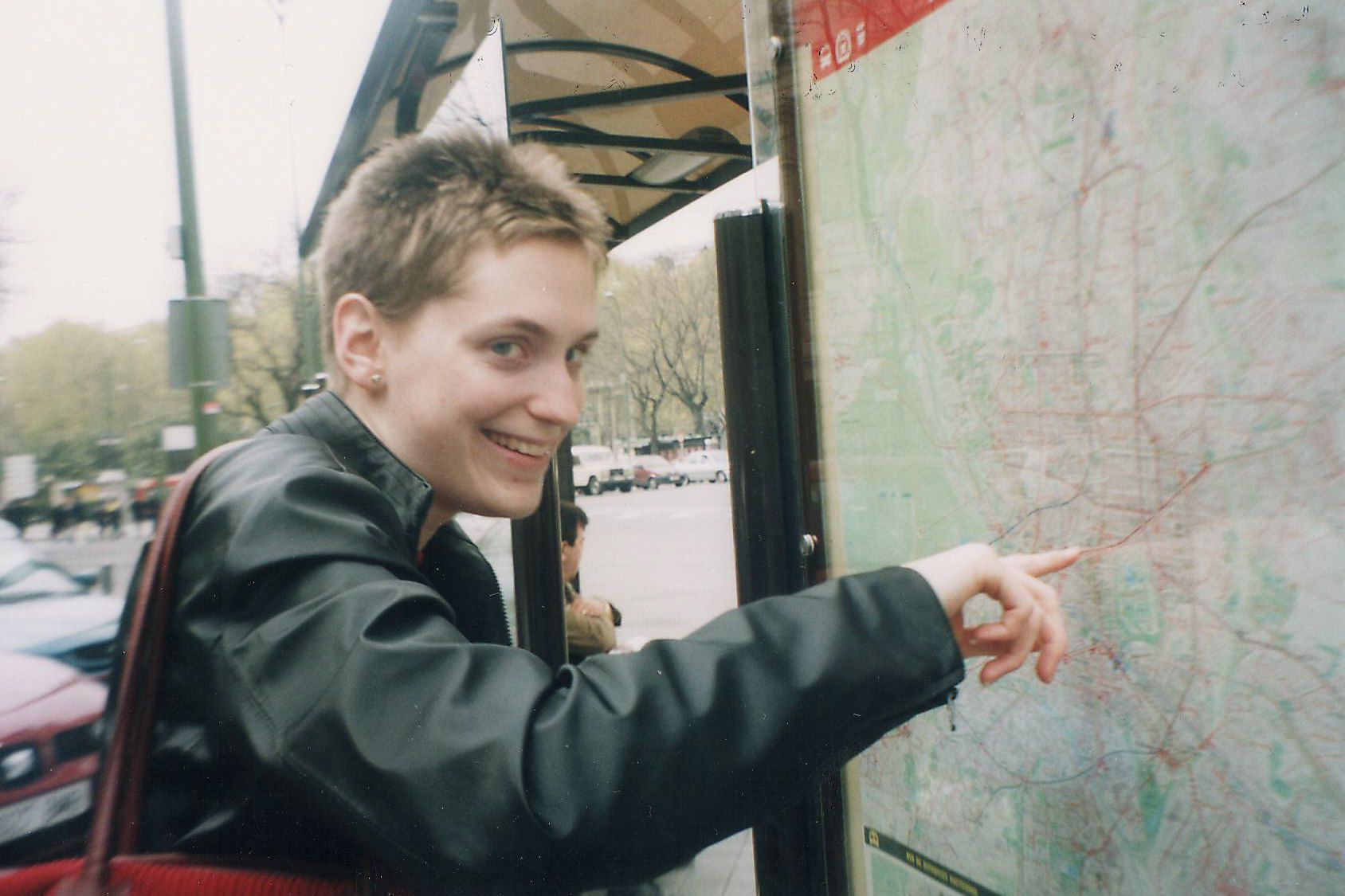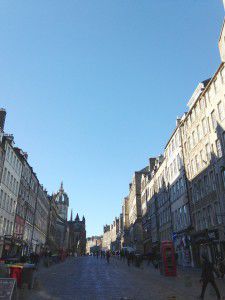10 reasons to visit… Edinburgh
I’m just about to go back to Edinburgh for my final year of university after having spent some time away from the city. I am determined to tick all of the touristy attractions off the list that make the ‘burgh a worthwhile destination, because it’s so true that when you live somewhere you don’t necessarily take advantage of the opportunities for adventure around you. Here are 10 must-sees that I have managed to experience – I wonder how much the list will have changed by this time next year!
1. Edinburgh Fringe Festival
Each year, around August time, a transformation takes over the city: almost every shop, every bar, every open space is descended on by the Fringe Festival: the biggest arts festival in the world. The first time I went I genuinely couldn’t believe the change that had come over the place I’d been living in for almost a year. There are people everywhere showcasing what they do and love best, whether that is interpretive dance or black comedy, street performance or orchestral ensembles. Some shows are free, others need to be booked far in advance, but I encourage you to go for something off the wall – with so much on offer, a disastrous morning performance can be forgotten with an incredible afternoon show!
2. The Royal Mile
This stretch of road runs from the iconic Scottish battlement that is Edinburgh Castle, to the Palace of Holyroodhouse, the official residence of the British monarch in Scotland. Both of these are highly recommended as places to visit, although I’ve not been to the Castle yet, as part of a university superstition. The Mile itself is flanked by terraces and shops, as well as street vendors and tours offering to show the horrible histories of the Windy City. There are also some great secret passages and alleyways that lead down to Princes Street via the Princes Street Gardens.
3. The National Museum of Scotland
Taking up almost the entirety of Chambers Street, including a controversial extension that holds the Museum of Scotland exhibits, The National Museum has a huge collection of artefacts from across the centuries. Although there are some temporary exhibitions that you have to pay for, you are free to roam around the majority of the museum. My personal favourite is the animal installation that spans three floors.
4. The Grassmarket/the Cowgate
Edinburgh is built on many different levels, and you can be forgiven for getting lost and confused with the topography of the city. Just down from the Royal Mile, the Grassmarket and the Cowgate are ideal locations for a good bite to eat and a drink (or two). There are quirky shops to be found cheek by jowl with hostels and cafés, as well as a few clubs if that’s what you’re looking for.
5. Arthur’s Seat
It’s not a hike, but an energetic walk, and the spectacular view from Arthur’s Seat to the hills, across the sea and out over to Fife is a definite must. It’s a perfect opportunity to take in the whole city, and get to grips with the wind!
6 – 8. Stockbridge
(6) Stockbridge Market on a Sunday is adorable: local produce, friendly people and all sorts of delectable goodies. There are also some lovely cafés in the area.
(7) If you’re in Stockbridge anyway, take a walk along the Water of Leith, which leads from Pentland Hills to the Forth of Firth at Leith. I’m not suggesting you tackle all 24 miles, but it makes for a different view of the city and a retreat from the hustle and bustle of the centre.
(8) The Royal Botanical Garden was founded in the 17th century, and continues to educate and explore to world-renowned status. It comprises four gardens and boasts an impressive collection of plants.
9. The Zoo
Now I’m not sure if you’ve heard, but they’ve got pandas. As well as these adorable, rare creatures, the zoo boasts the UK’s only koalas and an impressive ‘Discovery & Learning’ program for kids. If you can organise your trip for the right time, the Penguin Parade is a site for sore eyes, and other talks throughout the day are fascinating. The zoo is easily reachable by bus from Waverly Train station.
10. The Meadows
The University of Edinburgh area around Bristo Square and George Square backs onto The Meadows and further over to Bruntsfield Links. It’s a lovely spot for a little picnic or afternoon nap, and there’s sure to be people BBQ-ing too. Due to it being a student hub, you could also try out some of the lunchbox-sized lunch venues that won’t break the bank.
Have you visited Edinburgh? Share your own suggestions and tips in the comments for anyone planning a trip.
Lucy
PS Because this is a language blog, we felt we should add a footnote – English is the official language of Scotland, although it sounds a little different from the ‘Queen’s English’ spoken in much of England, particularly the south. Scotland also has two regional languages: Scottish Gaelic and Scots. You can learn Scottish Gaelic now with uTalk; watch this space for Scots!
The Art of Interpreting
Kana Tsumoto has just finished her internship with us, translating and recording our maths app into Japanese. In this post, she explains why she’s excited about her chosen career in interpreting.
The other night when I stayed at a youth hostel, I had an uncomfortable conversation with one of my roommates. I told her how I just finished a university course in Translation and Interpreting and how I am about to embark on my new career as a translator/interpreter. Then, in a not so roundabout way, she started to criticise my future profession, describing it as a boring task; merely repeating what has already been stated but in a different language! I shouldn’t have let her get on my nerves, but she did. I endured this for three days, and on the fourth she left. The initial joy felt at her absence soon descended into shame. It suddenly dawned on me that I had been a massive coward! I had failed to stand up for my profession, failed to defend it against a misinformed foe! Since then, I have been composing in my mind a grand speech on how wonderful translating and interpreting is. I would like to take this opportunity to share this speech, and dedicate it to my roommate in 303.
 Interpreting is, in fact, very exciting and very demanding! You definitely do need an extremely good command of the language you are interpreting into/from, but surprisingly more important are other skills including for example research management skills, communication skills, a sense of conciseness and even drawing skills! I was flabbergasted myself by this when I first started the course. Let me go through some of these skills with you.
Interpreting is, in fact, very exciting and very demanding! You definitely do need an extremely good command of the language you are interpreting into/from, but surprisingly more important are other skills including for example research management skills, communication skills, a sense of conciseness and even drawing skills! I was flabbergasted myself by this when I first started the course. Let me go through some of these skills with you.
Communicating skills: Interpreting belongs to the service industry. So as a service, being able to communicate with your clients is a vital skill. Interpreters need flexible communication skills to survive in many different environments, such as court rooms and their tense atmosphere, to the bonhomie found at sales talks, or the acute technical details found at academic conferences.
Researching: Interpreters spend a significant amount of time on research. This takes place prior to the actual performance. An hour long session of interpreting can require days, even weeks, of research for it to be successful. Research allows the interpreter to familiarise themselves with the terminology and theories that are going to be employed during a speech or conference. Interpretation without research is in some cases impossible. If you don’t know what is being said then how can you translate?! A good interpreter immerses themselves within their particular field, becoming expert in their chosen subject.

Drawing skills: We interpreters are artists when it comes to taking notes. During consecutive interpreting, we usually make quick notes of the speech. But of course we don’t have much time for writing down stuff, nor can we spend much time looking at the notes when performing; we have to talk to the audience, not to our notes! So we take notes through the medium of drawing, or rather, in symbols! The symbols need to be simple enough to scribble down and meaningful enough to allow us to understand the logical flow and the details in just one glance.
Last but definitely not least…
Sense of conciseness: This, I find most difficult to improve (I’m going to have trouble explaining conciseness concisely, oh dear!… But here I go!). The best translation that suits the context and the intention of the speech may not be the translation you find in the dictionary. A good interpreter never burdens the audience with the task of trying to understand the interpretations; they are like a guide on a cruise liner, taking with them passengers for a seaside tour in the greatest of comfort. A bad interpreter however, forces their passengers to balance out the back of the boat on water skis, whilst showing them the same scenery. Exercising the skills of conciseness in the midst of interpreting is not an easy task, and it comes only through lots and lots of practice. It is an art form, and when it is done right it is beautiful!
As you can see, interpreting can be a very demanding job. It comes with everyday hard work. The process of striving for something and then accomplishing it is definitely exciting. Now put that in your pipe and smoke it, my roommate from the hostel! 😉
Kana




